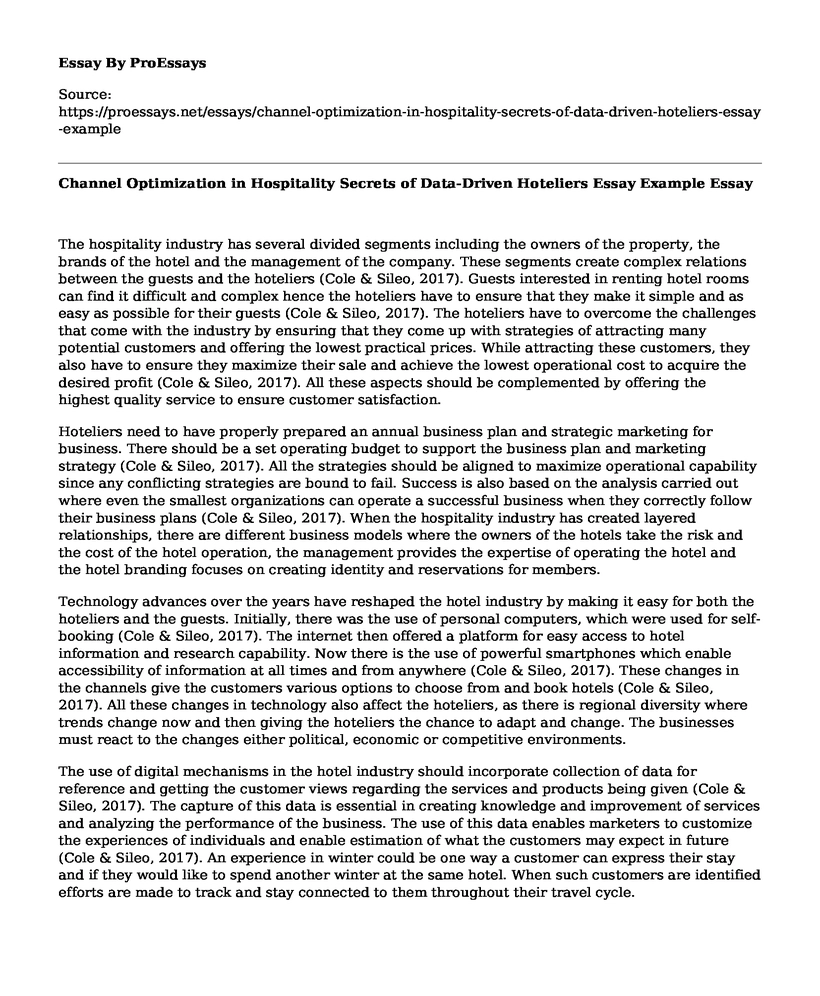The hospitality industry has several divided segments including the owners of the property, the brands of the hotel and the management of the company. These segments create complex relations between the guests and the hoteliers (Cole & Sileo, 2017). Guests interested in renting hotel rooms can find it difficult and complex hence the hoteliers have to ensure that they make it simple and as easy as possible for their guests (Cole & Sileo, 2017). The hoteliers have to overcome the challenges that come with the industry by ensuring that they come up with strategies of attracting many potential customers and offering the lowest practical prices. While attracting these customers, they also have to ensure they maximize their sale and achieve the lowest operational cost to acquire the desired profit (Cole & Sileo, 2017). All these aspects should be complemented by offering the highest quality service to ensure customer satisfaction.
Hoteliers need to have properly prepared an annual business plan and strategic marketing for business. There should be a set operating budget to support the business plan and marketing strategy (Cole & Sileo, 2017). All the strategies should be aligned to maximize operational capability since any conflicting strategies are bound to fail. Success is also based on the analysis carried out where even the smallest organizations can operate a successful business when they correctly follow their business plans (Cole & Sileo, 2017). When the hospitality industry has created layered relationships, there are different business models where the owners of the hotels take the risk and the cost of the hotel operation, the management provides the expertise of operating the hotel and the hotel branding focuses on creating identity and reservations for members.
Technology advances over the years have reshaped the hotel industry by making it easy for both the hoteliers and the guests. Initially, there was the use of personal computers, which were used for self-booking (Cole & Sileo, 2017). The internet then offered a platform for easy access to hotel information and research capability. Now there is the use of powerful smartphones which enable accessibility of information at all times and from anywhere (Cole & Sileo, 2017). These changes in the channels give the customers various options to choose from and book hotels (Cole & Sileo, 2017). All these changes in technology also affect the hoteliers, as there is regional diversity where trends change now and then giving the hoteliers the chance to adapt and change. The businesses must react to the changes either political, economic or competitive environments.
The use of digital mechanisms in the hotel industry should incorporate collection of data for reference and getting the customer views regarding the services and products being given (Cole & Sileo, 2017). The capture of this data is essential in creating knowledge and improvement of services and analyzing the performance of the business. The use of this data enables marketers to customize the experiences of individuals and enable estimation of what the customers may expect in future (Cole & Sileo, 2017). An experience in winter could be one way a customer can express their stay and if they would like to spend another winter at the same hotel. When such customers are identified efforts are made to track and stay connected to them throughout their travel cycle.
Conclusion
Data-driven strategies in decision making in the hotel industry are essential in preparation for disruptive completion from both within and outside the industry (Cole & Sileo, 2017). The use of data that is given by the customers enables evaluation of the customer experiences and satisfaction (Cole & Sileo, 2017). These evaluations are crucial in future decision making in regards to improving the services and products offered or being introduced. Having the right data ensures that the hotel can offer the right product, including the appropriate experience to the right person and for the right value and price.
References
Cole, R. & Sileo, L. (2017) Channel Optimization in Hospitality: Secrets of Data-Driven Hoteliers. New York: Phocuswright Inc.
Cite this page
Channel Optimization in Hospitality Secrets of Data-Driven Hoteliers Essay Example. (2022, Dec 06). Retrieved from https://proessays.net/essays/channel-optimization-in-hospitality-secrets-of-data-driven-hoteliers-essay-example
If you are the original author of this essay and no longer wish to have it published on the ProEssays website, please click below to request its removal:
- The Impact of Globalization on Culture and Business: A Case of Media and Advertising Service Industry
- JetBlue Closes in on Pilot Contract Essay Example
- Paper Example on Servicescape and Authenticity in Michelin Restaurant Dining
- Unleashing Talents for a Productive Society - Essay Sample
- Scanning and Foresight: Key to Security Regulation - Essay Sample
- Research Paper on Toyota's Strategies for Global Success: Investigating Operations
- Essay Example on Alex Morgan: Educational Leader, Student and Mentor







